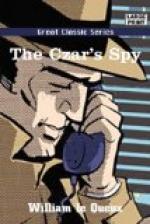“A very strange letter, is it not?” remarked the girl at my side. “I can’t make it out. You see there is no address, but the postmark is Russian. She is evidently in Russia.”
“In Finland,” I said, examining the stamp and making out the post town to be Abo. “But have you been to London and executed this strange commission?”
“No. We are going up next week. I intend to call upon this person named Woodroffe.”
I made no remark. He was, I knew, abroad, but I was glad at having obtained two very important clues: first, the address of the mysterious yachtsman, Woodroffe, alias Hornby, and, secondly, ascertaining that the young girl I sought was somewhere in the vicinity of the town of Abo, the Finnish port on the Baltic.
“Poor Elma, you see, speaks in her letter of some secret, Mr. Gregg,” my companion said. “She says she wishes this Mr. Woodroffe, whoever he is, to know that she has kept her promise and has not divulged it. This only bears out what I have all along suspected.”
“What are your suspicions?”
“Well, from her deep, thoughtful manner, and from certain remarks she at times made to me, I believe that Elma is in possession of some great and terrible secret—a secret which her uncle, Baron Oberg, is desirous of learning. I know she holds him in deadly fear—she is in terror that she may inadvertently betray to him the truth!”
CHAPTER IX
STRANGE DISCLOSURES ARE MADE
The strange letter of Elma Heath, combined with what Lydia Moreton had told me, aroused within me a determination to investigate the mystery. From the moment I had landed from the Lola on that hot, breathless night at Leghorn, mystery had crowded upon mystery until it was all bewildering.
It was now proved that the sweet-faced girl, the original of the torn photograph, held a secret, and that, by her own words, she knew that death was approaching. The incomprehensible attempt upon my life, the strange actions of Hornby and Chater—who, by the way, seemed to have entirely disappeared—the assassination of the man who by masquerading as the Italian waiter had met his death, and the murder of Olinto’s wife were all problems which required solution.
Had it not been for the mystery of it all—and mystery ever arouses the human curiosity—I should have given up trying to get at the truth. Yet as a man with some leisure, and knowing by that letter of Elma Heath’s that she was in sore distress, I redoubled my efforts to ascertain the reason of it all.
The mystery of the Lola was still a mystery along the Mediterranean. At every French and Italian port the yacht’s false name and general build was written in the police-books, while at Lloyd’s the name Lola was marked down as among the mysterious craft at sea.
Chater was missing, while Hornby was abroad. Perhaps they were both cruising again, with their yacht repainted and bearing a fresh name. But why? What had been their motive?




